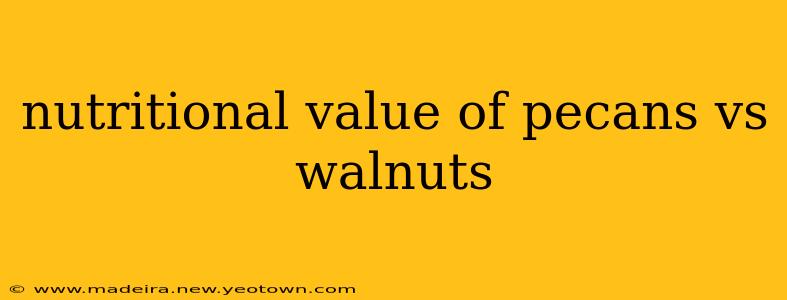For years, pecans and walnuts have battled it out for the title of "king of nuts." Both boast impressive nutritional profiles, but which one reigns supreme? This isn't just a simple comparison; it's a deep dive into the world of these delicious and incredibly healthy nuts. Let's settle this once and for all, shall we?
Our tale begins in the heart of the orchard, where these two powerhouses grow. While both offer incredible health benefits, their nutritional compositions differ slightly, leading to varied impacts on our well-being. Think of it as a culinary duel – with your health as the ultimate prize.
Nutritional Breakdown: Pecans vs. Walnuts
Let's start with the facts. A one-ounce serving (about 19 pecan halves or 14 walnut halves) provides a nutritional powerhouse, but the specifics vary:
Pecans: Higher in fat (especially monounsaturated fats), offering a good source of vitamin E (a powerful antioxidant), and boasting a slightly higher manganese content.
Walnuts: Known for their higher levels of omega-3 fatty acids (specifically alpha-linolenic acid or ALA), a type of essential fat crucial for brain health and heart function. They also contain more melatonin, a hormone that regulates sleep.
Both are packed with fiber, protein, and a range of other vitamins and minerals, including magnesium, phosphorus, and zinc. The small differences in their composition, however, translate to slightly different health benefits.
Are Pecans Healthier Than Walnuts? (And Vice Versa!)
This isn't a simple "yes" or "no" question. Both nuts offer incredible health advantages. The "healthier" nut depends on your specific dietary needs and health goals.
Which nut is better for heart health?
Both pecans and walnuts are excellent for heart health. Pecans' monounsaturated fats contribute to lowering LDL ("bad") cholesterol, while walnuts' omega-3 fatty acids are renowned for reducing the risk of heart disease and improving blood vessel function. The choice comes down to personal preference and potentially existing dietary needs.
Which nut is better for brain health?
Walnuts have a slight edge here due to their higher omega-3 fatty acid content, which is essential for brain function and development. These fatty acids may also help protect against cognitive decline. Pecans, however, still provide brain-boosting nutrients, just in different quantities.
What are the benefits of eating pecans?
Pecans are rich in antioxidants, which combat free radical damage and may reduce the risk of chronic diseases. Their higher manganese content is also crucial for bone health and wound healing.
What are the benefits of eating walnuts?
Beyond their brain-boosting properties, walnuts are a fantastic source of fiber, promoting healthy digestion and potentially lowering cholesterol levels. Their melatonin content can also contribute to improved sleep quality.
The Verdict: It's a Tie (Almost!)
There's no single winner in the pecan vs. walnut debate. Both nuts provide significant health benefits, and their subtle differences in nutritional composition cater to slightly different needs. The best choice depends on individual preferences and dietary requirements. The most crucial aspect is including these nutritional powerhouses in your diet. Sprinkle them on salads, add them to your baked goods, or simply enjoy them as a healthy snack. The ultimate winner is your health! Enjoy the delicious and nutritious journey!

